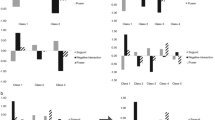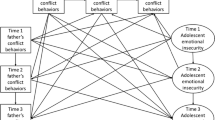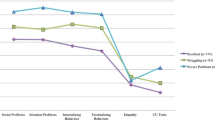Abstract
This paper presents results on the intergenerational transmission of interpersonal problems. Ninety-eight German mothers, fathers, and their young adult offspring completed the German version of the Inventory of Interpersonal Problems (IIP-D64), which is conceptually based on the assumption of a circumplex structure of eight interpersonal problems. Model learning and psychodynamic theories were used to formulate assumptions about possible intergenerational similarity and dissimilarity, as well as about effects of family and societal context. The results showed the highest intergenerational correlations for three of the eight interpersonal problems in the IIP-D64, namely nonassertiveness, overly strong accommodation, and self-sacrificing tendencies. Intergenerational similarity was found only for mother–offspring dyads for two other problems: domineering and vindictiveness tendencies. No significant intergenerational similarity was found for coldness, social inhibition, or intrusiveness. In-depth analyses revealed higher similarities in families in which at least one parent had an overall IIP-64 score equal to or more than one standard deviation from the norm sample mean (as opposed to families where both parents had overall IIP-64 scores closer to the normative German mean). The findings are tentatively interpreted as suggesting that intergenerational transmission occurs only for problems on one axis of the interpersonal circumplex, i.e., the agency axis, but not for problems on the communality axis.
Similar content being viewed by others
References
Bakermans-Kranenburg, M. J., & van IJzendoorn, M. H. (2011). Differential susceptibility to rearing environment depending on dopamine-related genes: New evidence and a meta-analysis. Development and Psychopathology, 23, 39–52.
Bandura, A. (1971). Psychological modelling. New York: Lieber-Antherton.
Beaver, K. M., & Belsky, J. (2012). Gene-environment interaction and the intergenerational transmission of parenting: Testing the differential-susceptibility hypothesis. Psychiatric Quarterly, 83(1), 29–40.
Besharat, M. A., & Habibi, M. (2004). A comparative study of interpersonal problems among twins and singletons. Twin Research and Human Genetics, 7(4), 339.
Boehnke, K. (2004). Do our children become as we are? Intergenerational value transmission and societal value change-two unlinked concepts in social research. In F. Hardt (Ed.), Mapping the world: New perspectives in the humanities and social sciences (pp. 99–118). Tübingen: Francke.
Boehnke, K., Hadjar, A., & Baier, D. (2007). Parent-child value similarity: The role of zeitgeist. Journal of Marriage and Family, 69, 778–792.
Boehnke, K., Ittel, A., & Baier, D. (2002). Value transmission and ‘zeitgeist’: An underresearched relationship. Sociale Wetenschappen, 45, 28–43.
Bolgar, R., Zweig-Frank, H., & Paris, J. (1995). Childhood antecedents of interpersonal problems in young adult children of divorce. Journal of the American Academy of Child and Adolescent Psychiatry, 34(2), 143–150.
Brähler, E., Horowitz, L. M., Kordy, H., Schumacher, J., & Strauß, B. (1999). Zur Validierung des Inventars zur Erfassung Interpersonaler Probleme (IIP)—Ergebnisse einer Repräsentativbefragung in Ost- und Westdeutschland [Validation of the inventory of interpersonal problems (IIP)—Results of a representative study in East and West Germany]. Psychotherapie, Psychosomatik, Medizinische Psychologie, 49(11), 422–431.
Campbell, D. T., & Stanley, J. C. (1963). Experimental and quasi-experimental designs for research on teaching. In N. L. Gage (Ed.), Handbook of research on teaching (pp. 171–246). Chicago, IL: Rand McNally.
Cohen, J. (1992). A power primer. Psychological Bulletin, 112, 155–159.
Coolidge, F. L., Thede, L. L., & Jang, K. L. (2001). Heritability of childhood personality disorders: A preliminary study. Journal of Personality Disorders, 15, 33–40.
Erikson, E. H. (1959). Identity and the life cycle. Psychological Issues, 1, 1–171.
Hadjar, A., Boehnke, K., Knafo, A., Daniel, E., Musiol, A.-L., Schiefer, D., & Möllering, A. (2012). Parent-child value similarity and subjective well-being in the context of migration: An exploration. Family Science, 3, 55–63.
Heer, D. M. (1963). The measurement and bases of family power: An overview. Marriage and Family Living, 25, 133–139.
Horowitz, L. M., Alden, L. E., Wiggins, J. S., & Pincus, A. L. (2000a). Inventory of Interpersonal Problems manual. Odessa, FL: The Psychological Corporation.
Horowitz, L. M., Rosenberg, S. E., Baer, B. A., Ureno, G., & Villasenor, V. S. (1988). Inventory of interpersonal problems: Psychometric properties and clinical applications. Journal of Consulting and Clinical Psychology, 56, 885–892.
Horowitz, L. M., Strauß, B., & Kordy, H. (2000b). Inventar zur Erfassung Interpersonaler Probleme—Deutsche Version [Inventory for the assessment of interpersonal problems—German version]. Manual. Göttingen: Beltz.
Horowitz, L. M., & Vitkus, J. (1986). The interpersonal basis of psychiatric symptomatology. Clinical Psychology Review, 6, 443–469.
Jung, C. G. (1933). Die Beziehungen zwischen dem Ich und dem Unbewußten [The relationsship between the ego and the unconscious]. Zürich: Rascher.
Kiesler, D. J. (1983). The 1982 interpersonal circle: A taxonomy for complementarity in human transactions. Psychological Review, 90, 185–214.
Knafo, A., & Spinath, F. M. (2011). Genetic and environmental influences on girls’ and boys’ gender-typed and gender-neutral values. Developmental Psychology, 47, 726–731.
Leary, T. (1957). Interpersonal diagnosis of personality. New York: Ronald.
Locke, K. D. (2005). Interpersonal problems and interpersonal expectations in everyday life. Journal of Social and Clinical Psychology, 24, 915–931.
Rammstedt, B., & Farmer, R. F. (2013). The impact of acquiescence on the evaluation of personality structure. Psychological Assessment, 25(4), 1137–1145.
Rammstedt, B., Goldberg, L. R., & Borg, I. (2010). The measurement equivalence of Big Five factor markers for persons with different levels of education. Journal of Research in Personality, 44, 53–61.
Sayer, L. C., Bianchi, S. M., & Robinson, J. P. (2004). Are parents investing less in children? Trends in mothers’ and fathers’ time with children. American Journal of Sociology, 110(1), 1–43.
Schlippe, A. V., & Schweitzer, J. (1996). Lehrbuch der systemischen Therapie und Beratung [Textbook of systemic therapy and counseling]. Göttingen: Vandenhoeck & Ruprecht.
Schwartz, S. H. (1992). Universals in the content and structure of values: Theoretical advances and empirical tests in 20 countries. Advances in Experimental Social Psychology, 25, 1–65.
Sullivan, H. S., Perry, H. S., & Gawel, M. L. (1953). The interpersonal theory of psychiatry. New York: Norton.
Tavakol, M., & Dennick, R. (2011). Making sense of Cronbach’s alpha. International Journal of Medical Education,. doi:10.5116/ijme.4dfb.8dfdISSN:2042-6372.
Vedder, P., Berry, J., Sabatier, C., & Sam, D. (2009). The intergenerational transmission of values in national and immigrant families: The role of Zeitgeist. Journal of Youth and Adolescence, 38(5), 642–653.
Youniss, J. (1980). Parents and peers in social development: A Sullivan–Piaget perspective. Chicago: University of Chicago Press.
Zajonc, R. B. (1968). Attitudinal effects of mere exposure. Journal of Personality and Social Psychology, 9, Monograph supplement No. 2, Part 2.
Acknowledgments
This research was supported by Grant I-241-065 from the German-Israeli Foundation for Scientific Research and Development (GIF), awarded to the author and to Shalom H. Schwartz, The Hebrew University of Jerusalem.
Author information
Authors and Affiliations
Corresponding author
Rights and permissions
About this article
Cite this article
Boehnke, K. The Intergenerational Transmission of Interpersonal Problems: An Exploration. J Child Fam Stud 24, 2999–3008 (2015). https://doi.org/10.1007/s10826-014-0103-5
Published:
Issue Date:
DOI: https://doi.org/10.1007/s10826-014-0103-5




